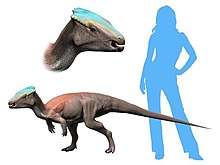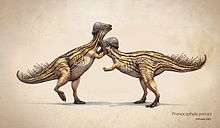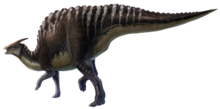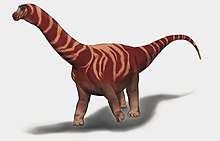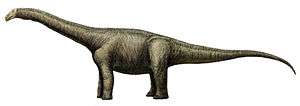Nemegt Formation
The Nemegt Formation (also known as Nemegtskaya Svita) is a geological formation in the Gobi Desert of Mongolia, dating to the Late Cretaceous. The formation consists of river channel sediments and contains fossils of fish, turtles, crocodilians, and a diverse fauna of dinosaurs, including birds.
| Nemegt Formation Stratigraphic range: Maastrichtian ~70 Ma | |
|---|---|
 Altan Uul III locality, a highly fossiliferous location of the formation | |
| Type | Geological formation |
| Sub-units | Lower, Middle and Upper units |
| Underlies | Alluvium |
| Overlies | Barun Goyot Formation |
| Thickness | Over 235 m (771 ft) |
| Lithology | |
| Primary | Shale, sandstone |
| Other | Mudstone, conglomerate |
| Location | |
| Coordinates | 43.5°N 101.0°E |
| Approximate paleocoordinates | 40.8°N 90.2°E |
| Region | Bayankhongor Aimag, Omnogov, Ovorhangai |
| Country | |
| Extent | Gobi Desert |
Cretaceous-aged dinosaur fossil localities of Mongolia. Nemegt localities at area A | |
Description
The Nemegt Formation is composed of mudstones and sandstones that were deposited by ancient lakes, streams, and flood plains. The Altan Ula locality was described by Michael Novacek as "a canyon carved out of a very rich series of sedimentary rocks" with "steep cliffs and narrow washes". The climate associated with it was wetter than when preceding formations were deposited; there seems to have existed at least some degree of forest cover. Fossilized trunks have been also found. These petrified wood, and the remains of Araucariaceae conifers indicate that the forests of the Nemegt were thickly wooded, with a high canopy formed by tall conifer trees. When examined, the rock facies of this formation suggest the presence of stream and river channels, mudflats, and shallow lakes. Sediments also indicate that there existed a rich habitat, offering diverse food in abundant amounts that could sustain massive Cretaceous dinosaurs.[1][2]
Stratigraphy
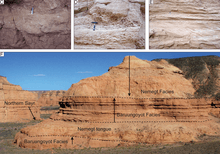
The most recent stratigraphy divides the Nemegt Formation into three informal members. The lower member is dominated by fluvial deposits, while middle and upper members consist of alluvial plain, paludal, lacustrine, and fluvial deposits. The colour of the sediments is usually light grey to tan in colour in comparison to the typically red colour of the underlying Barun Goyot Formation.[3] It overlies and sometimes interfingers with the Barun Goyot Formation. Interfingering has been noted at the stratotype (Red Walls) and Khermeen Tsav.[3] There has been no absolute dating of the Nemegt Formation. Historically the Nemegt has been considered late Campanian to Maastrichtian, based on comparisons of fossils present, but no exact dating has been performed. The age for the underlying Baruungoyot Formation (= Svita) has been suggested as Santonian to Campanian, and Shuvalov (2000) found K-Ar dating of basalts that they referred to the mid and upper Baruungoyot to be 75 to 80 million years old.[4]
Flora and fauna of the Nemegt Formation
Coelurosaurs
Oviraptorosaurs
| Genus | Species | Location | Stratigraphic Position | Material | Notes | Images |
|---|---|---|---|---|---|---|
|
Avimimus portentosus |
An avimimid. |
 Avimimus portentosus | ||||
|
Avimimus nemegtensis[5] |
An avimimid. | |||||
|
Elmisaurus rarus |
"[Three] pedes [and a] manus."[6] |
A caenagnathid. | ||||
|
Conchoraptor gracilis |
|
|
"Partial skeleton with skull, [four] partial skulls, [and] numerous skull and postcranial fragments."[6] |
|||
|
Gobiraptor minutus |
An oviraptorid. | |||||
|
Nemegtomaia barsboldi |
An oviraptorid. | |||||
|
Nomingia gobiensis |
"Partial postcranium."[7] |
|||||
|
Rinchenia mongoliensis |
"Skull and fragmentary postcranium."[7] |
An oviraptorid. | ||||
Paravians
| Genus | Species | Location | Stratigraphic Position | Material | Notes | Images |
|---|---|---|---|---|---|---|
|
Adasaurus mongoliensis[8] |
"Partial skull and fragmentary postcrania."[9] |
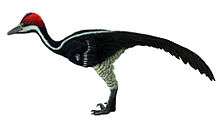 Zanabazar | ||||
|
Borogovia gracilicrus |
"Partial hindlimbs."[10] |
A troodontid. | ||||
|
Brodavis mongoliensis |
||||||
|
Gurilynia nessovi |
"Shoulder girdle and forelimb elements."[12] |
An enantiornithine. | ||||
|
Judinornis nogontsavensis |
"Vertebra."[13] |
A hesperornithine. | ||||
|
S. junior |
Reclassified as Zanabazar junior | |||||
|
Teviornis gobiensis |
An anseriform related to modern ducks and geese. | |||||
|
Tochisaurus nemegtensis |
A metatarsus.[10] |
A troodontid. | ||||
|
Zanabazar[14] |
Zanabazar junior[8] |
"Skull with fragmentary postcranial skeleton."[10] |
A troodontid. | |||
Other coelurosaurs
| Genus | Species | Location | Stratigraphic Position | Material | Notes | Images |
|---|---|---|---|---|---|---|
|
Alioramus remotus[8] |
A tyrannosaur. |
| ||||
|
Alioramus altai |
A tyrannosaur. | |||||
|
Anserimimus planinychus |
"Incomplete postcranium."[15] |
An ornithomimid. | ||||
|
Bagaraatan ostromi |
"Fragmentary skull and associated postcranium."[16] |
A possible tyrannosauroid. | ||||
|
Deinocheirus mirificus[8] |
"Forelimb elements, skull. Two new specimens together provide a nearly complete skeleton."[15] |
A gigantic ornithomimosaur. | ||||
|
Gallimimus bullatus[8] |
"[Three] nearly complete skeletons, complete postcranium, skull with associated frgamentary postcranium, [and] other fragmentary postcrania.",[15] and two full skeletons "[17] |
An ornithomimid. | ||||
|
Mononykus olecranus |
An alvarezsaurid. | |||||
|
Nemegtonykus citus |
An alvarezsaurid. | |||||
|
Raptorex kreigsteni[18] |
A tyrannosaurid, may be a juvenile Tarbosaurus.[19] | |||||
|
Tarbosaurus bataar[8] |
"A skull and [Two] skeletons [20] | A tyrannosaur. Articulated skeletons are unusually common here. | ||||
|
Therizinosaurus cheloniformis[21] |
Upper White Beds of Khermeen Tsav |
"Two specimens with forelimb elements and one with a referred hindlimb."[22] |
A giant therizinosaurid. | |||
Invertebrates
| Genus | Species | Location | Stratigraphic Position | Abundance | Notes |
|---|---|---|---|---|---|
|
Nemegtia |
An ostracod. | ||||
Mammals
| Genus | Species | Location | Stratigraphic Position | Abundance | Notes | Images |
|---|---|---|---|---|---|---|
|
Buginbaatar transaltaiensis |
A multituberculate. |
|||||
|
A mysterious metatherian, possibly a sparassodont. | ||||||
Ornithischians
| Genus | Species | Location | Stratigraphic Position | Material | Notes | Images |
|---|---|---|---|---|---|---|
|
Barsboldia sicinskii |
"Sacrum [and] pelvis."[23] |
A hadrosaurid. |
| |||
|
Dyoplosaurus giganteus |
An ankylosaur. Formerly synonymized with Tarchia kielanae, now considered a nomen dubium.[24] | |||||
|
Homalocephale calathoceros |
A pachycephalosaur. | |||||
|
P. prenes |
"Complete skull with associated partial postcranium."[25] |
|||||
|
Saichania chulsanensis |
"Complete skull" | An ankylosaur, also found in the Barun Goyot Formation. | ||||
|
Saurolophus angustirostris |
"At least [fifteen] specimens, including articulated skull and postcranial skeleton."[23] |
A hadrosaurid. | ||||
|
Tarchia teresae[26] |
An ankylosaur. | |||||
Sauropods
| Genus | Species | Location | Stratigraphic Position | Material | Notes | Images |
|---|---|---|---|---|---|---|
|
Nemegtosaurus mongoliensis |
Skull, hindlimb material, anterior caudal.[27] |
A titanosaur. |
| |||
|
Opisthocoelicaudia skarzynskii |
"Skeleton lacking skull and cervical series."[28] |
A titanosaur. | ||||
Pterosaurs
| Genus | Species | Location | Stratigraphic Position | Material | Notes | Images |
|---|---|---|---|---|---|---|
|
Unnamed Azhdarchid |
Fragmentary cervical vertebrae.[29] |
Estimated to be one of the largest of the Azhdarchids, it has been nicknamed the “Mongol Giant”. It is thought to have been a short necked Azhdarchid, like Hatzegopteryx. |
 The Mongol Giant in a running gait (Speculative reconstruction) | |||
Fossil Eggs
| Oogenus | Oospecies | Location | Stratigraphic Position | Material | Notes | Images |
|---|---|---|---|---|---|---|
|
Laevisoolithus sochavai |
"Whole egg with partly broken pole"[30] |
Laid by a bird or small theropod.[30] | ||||
|
Subtiliolithus microtuberculatus[30] |
"Eggshell fragments"[30] |
|||||
See also
- Barun Goyot Formation
- Djadochta Formation
- List of fossil sites
- Nemegt Basin
- List of dinosaur-bearing rock formations
References
- Novacek, M. (1996). Dinosaurs of the Flaming Cliffs. Bantam Doubleday Dell Publishing Group Inc. New York, New York. ISBN 978-0-385-47775-8
- Owocki, K.; Kremer, B.; Cotte, M.; Bocherens, H. (2020). "Diet preferences and climate inferred from oxygen and carbon isotopes of tooth enamel of Tarbosaurus bataar (Nemegt Formation, Upper Cretaceous, Mongolia)". Palaeogeography, Palaeoclimatology, Palaeoecology. 537: 109190. doi:10.1016/j.palaeo.2019.05.012.
- Eberth, David A. (1 April 2018). "Stratigraphy and paleoenvironmental evolution of the dinosaur-rich Baruungoyot-Nemegt succession (Upper Cretaceous), Nemegt Basin, southern Mongolia". Palaeogeography, Palaeoclimatology, Palaeoecology. 494: 29–50. doi:10.1016/j.palaeo.2017.11.018.
- Shuvalov, V.F. (2000). "The Cretaceous stratigraphy and palaeobiogeography of Mongolia". In Benton, Michael J.; Shishkin, Mikhail A.; Unwin, D.M.; Kurochkin, E.N. (eds.). The Age of Dinosaurs in Russia and Mongolia. Cambridge University Press. pp. 256–278. ISBN 0-521-55476-4.
- Funston, G. F.; Mendonca, S. E.; Currie, P. J.; Barsbold, R. (2017). "Oviraptorosaur anatomy, diversity and ecology in the Nemegt Basin". Palaeogeography, Palaeoclimatology, Palaeoecology. doi:10.1016/j.palaeo.2017.10.023.
- "Table 8.1," in Weishampel, et al. (2004). Page 167.
- "Table 8.1," in Weishampel, et al. (2004). Page 166.
- Barsbold, R. (1983). "Carnivorous dinosaurs from the Cretaceous of Mongolia [in Russian]." Trudy, Sovmestnaâ Sovetsko−Mongol’skaâ paleontologičeskaâ èkspediciâ, 19: 1–120.
- "Table 10.1," in Weishampel, et al. (2004). Page 198.
- "Table 9.1," in Weishampel, et al. (2004). Page 185.
- Larry D. Martin, Evgeny N. Kurochkin and Tim T. Tokaryk (2012). "A new evolutionary lineage of diving birds from the Late Cretaceous of North America and Asia". Palaeoworld. 21. doi:10.1016/j.palwor.2012.02.005.
- "Table 11.1," in Weishampel, et al. (2004). Page 213.
- "Table 11.1," in Weishampel, et al. (2004). Page 215.
- Norell, M.A.; Makovicky, P.J.; Bever, G.S.; Balanoff, A.M.; Clark, J.M.; Barsbold, R.; Rowe, T. (2009). "A Review of the Mongolian Cretaceous Dinosaur Saurornithoides (Troodontidae: Theropoda)". American Museum Novitates. 3654: 63. doi:10.1206/648.1. hdl:2246/5973.
- "Table 6.1," in Weishampel, et al. (2004). Page 138.
- "Table 5.1," in Weishampel, et al. (2004). Page 112.
- http://www.dvidshub.net/image/1442492/gallimimus-slab#.U8V4urF5bAx
- Michael G. Newbrey, Donald B. Brinkman, Dale A. Winkler, Elizabeth A. Freedman, Andrew G. Neuman, Denver W. Fowler and Holly N. Woodward (2013). "Teleost centrum and jaw elements from the Upper Cretaceous Nemegt Formation (Campanian-Maastrichtian) of Mongolia and a re-identification of the fish centrum found with the theropod Raptorex kreigsteini" (PDF). In Gloria Arratia; Hans-Peter Schultze; Mark V. H. Wilson (eds.). Mesozoic Fishes 5 – Global Diversity and Evolution. Verlag Dr. Friedrich Pfeil. pp. 291–303. ISBN 978-3-89937-159-8. Archived from the original (PDF) on 2015-09-24.CS1 maint: multiple names: authors list (link)
- Fowler DW, Woodward HN, Freedman EA, Larson PL, Horner JR (2011) Reanalysis of “Raptorex kriegsteini”: A Juvenile Tyrannosaurid Dinosaur from Mongolia. PLoS ONE 6(6): e21376. doi:10.1371/journal.pone.0021376
- http://www.dvidshub.net/image/1442496/skull-tarbosaurus-baatar#.U8V7LrF5bAw
- Maleev, E. A. (1954). "Noviy cherepachoobrazhniy yashcher v Mongolii" [New turtle−like reptile in Mongolia]. Priroda (3): 106−108. Translated paper
- Zanno, L. E. (2010). "A taxonomic and phylogenetic re-evaluation of Therizinosauria (Dinosauria: Maniraptora)". Journal of Systematic Palaeontology. 8 (4): 503−543. doi:10.1080/14772019.2010.488045.
- "Table 20.1," in Weishampel, et al. (2004). Page 441.
- Arbour, V. M., Currie, P. J. and Badamgarav, D. (2014), The ankylosaurid dinosaurs of the Upper Cretaceous Baruungoyot and Nemegt formations of Mongolia. Zoological Journal of the Linnean Society, 172: 631–652. doi: 10.1111/zoj.12185
- "Table 21.1," in Weishampel, et al. (2004). Page 465.
- Paul Penkalski; Tatiana Tumanova (2016). "The cranial morphology and taxonomic status of Tarchia (Dinosauria: Ankylosauridae) from the Upper Cretaceous of Mongolia". Cretaceous Research. in press. doi:10.1016/j.cretres.2016.10.004.
- Philip J. Currie; Jeffrey A. Wilson; Federico Fanti; Buuvei Mainbayar; Khishigjav Tsogtbaatar, in press. Rediscovery of the type localities of the Late Cretaceous Mongolian sauropods Nemegtosaurus mongoliensis and Opisthocoelicaudia skarzynskii: Stratigraphic and taxonomic implications. Palaeogeography, Palaeoclimatology, Palaeoecology doi:10.1016/j.palaeo.2017.10.035.
- "Table 13.1," in Weishampel, et al. (2004). Page 270.
- Takanobu Tsuihiji, Brian Andres, Patrick M. O'connor, Mahito Watabe, Khishigjav Tsogtbaatar & Buuvei Mainbayar (2017) Gigantic pterosaurian remains from the Upper Cretaceous of Mongolia, Journal of Vertebrate Paleontology doi:10.1080/02724634.2017.1361431
- K. E. Mikhailov. 1991. Classification of fossil eggshells of amniotic vertebrates. Acta Palaeontologica Polonica 36(2):193-238
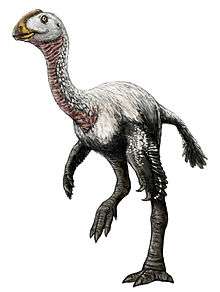
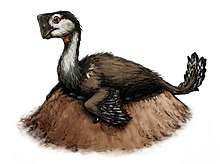
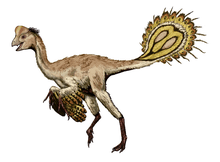
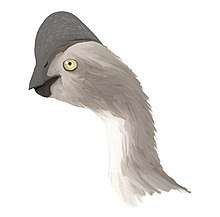

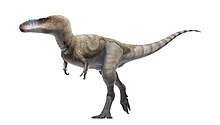
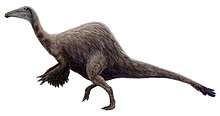
.jpg)
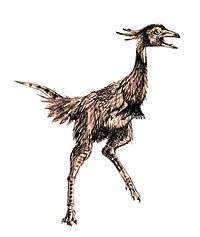
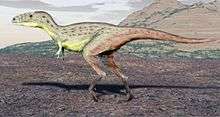

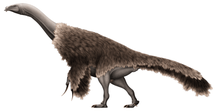
.jpg)
